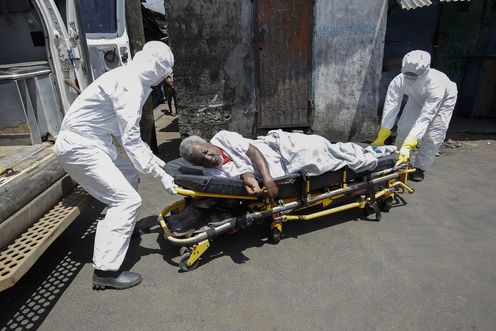
Economists are being called upon to estimate the costs of the Ebola epidemic to West Africa and elsewhere. However, economists should also play a part in estimating the likelihood of the disease spreading. Economics is the study of incentives, and many biological models of the spread of the disease may be underestimating the impact of individual incentives.
Assessments of the cost of Ebola in West Africa are grim. The World Bank estimates the impact of Ebola on Liberia, Guinea and Sierra Leone this year is around 3% of GDP. It estimates these governments have incurred financial losses of a similar magnitude. The impact on West Africa as a whole is tipped to be between US$2 billion and US$7 billion.
Important agricultural regions are under quarantine, interrupting production and sales. This will to lead to food shortages. Retailers are also reporting a 50% to 75% drop in turnover as people avoid human contact. According to The Economist, the response is that “investors evacuate foreign workers, borders close and international flights are suspended”.
The risk of further embargoes also mean that exporters are suspending production and investment in the region. Already Sime Darby, the world’s largest listed producer of oil palm, is slowing production and Sifca Group, an Ivory Coast-based agribusiness, has stopped exporting rubber.
If Ebola spreads throughout West Africa, the cost could rise to US$32.6 billion by the end of 2015. There are larger and more populous countries nearby and Nigeria has already contained one outbreak. Many of these countries are more integrated with the world economy – Lagos in Nigeria is a major travel hub. The trade and travel embargoes would be extremely costly and the costs in terms of lost output would also be hefty.
These costs do not even take into account the damage to the health system from the loss of many health-care workers, nor the damage to the economy from lost workers and schooling. They also fail to take into account the enormous personal toll of those who lose family and friends to the disease.
These estimates give some indication of the costs faced if Ebola were to penetrate other parts of the world. These costs would be significantly higher because developed economies rely much more on trade and travel.
Are Western countries likely to be safe from contagion?
The response of Western governments has been vastly insufficient to contain the outbreak, according to the World Bank and Medecins Sans Frontieres. Governments have provided too few military and health professionals, and little funding.
In response to pressure, Australia has recently provided A$20 million for a 100-bed hospital in Sierra Leone, but no medical personnel. This suggests the Australian government believes Ebola will be largely restricted to West Africa. Applying economic theory can assess whether this is correct.
This belief seems to rest on two pillars: first, that the risk of contagion is low for informed individuals because transmission is through bodily fluids; and second, that some combination of reduced travel to West Africa and the quarantine of at-risk returnees will be effective.
The first belief seems reasonable if there are a small number of cases. By taking extreme precautions about touching others, the spread of the disease may be halted. However, as the number of unidentified cases in the population expands, public places become a potential risk.
It is daunting to consider that at the critical stage of the illness, patients lose five to ten litres of contagious fluids per day. Beyond a small number of cases, hospitals’ capacity to safely dispose of these fluids could easily be overwhelmed. The Emory university hospital treating three Ebola patients had to use an autoclave to sterilise 1360 kilograms of medical waste.
Biologists say mass contagion is unlikely in the West. However, they have serious concerns about India and China with their dense populations and poor public health systems.
US Centers for Disease Control and Prevention director Thomas Frieden says: “We have got infection control in hospitals and public health that tracks and isolates people if they get symptoms.“ However, this view may be overlooking the incentives driving at-risk individuals.
Individual self-interest in conflict with society’s interests
While it is in society’s interest for individuals to declare any contact with Ebola, it is not in the individual’s interest. Thomas Duncan, who died in Texas from Ebola, did not disclose his contact with a sick patient to Liberian authorities. An individual’s freedom of travel may be severely curtailed.
Australia and the United States have already implemented home quarantine orders for at-risk individuals. However, at least one person has refused to comply. If the individual is identified while in a country with low-budget quarantine procedures, they may be around other at-risk individuals, which is certainly not in their interest.
Individuals are also unlikely to respect any travel ban. Modelling by Northeastern University suggests that a 90% reduction in flights to West Africa would delay the spread by only a few months. Individuals will enter through other countries, meaning they will be harder to track and isolate.
Based on cost-benefit analysis, the potential costs of Ebola spreading are extremely high and the risks may be much higher than they are currently portrayed. Voters and donors should support greater efforts to end Ebola in West Africa. As International Monetary Fund director Christine Lagarde says, “real action” is needed to counter the outbreak. Without such action Ebola places the global economy at risk.
Catherine de Fontenay has donated to Medecins Sans Frontieres in their efforts to contain the ebola crisis.
